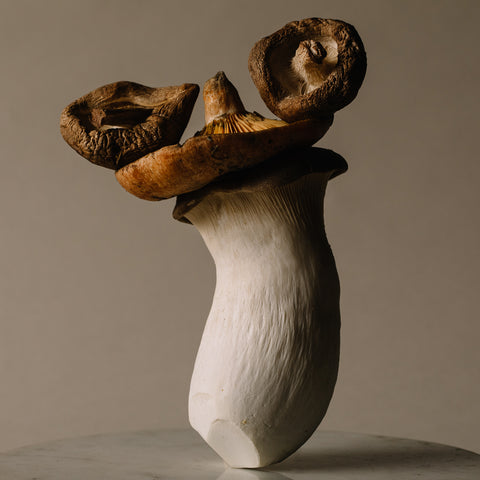
By: @shatiachesson
Delicious, deadly, magical, intoxicating and mysterious. Over the years, mushrooms have had many reputations (both good and bad) among spiritual communities, the culinary world, medical professions, environmentalists, religious organizations, and your local hippies and rebels. With the recent trend towards locally sourced foods and foraging, mushrooms are more popular now than ever before.
In the culinary world, mushrooms are often categorized as a vegetable, although they are actually fungi. For those who consume a fully plant based diet, mushrooms are commonly used as a meat substitute due to the thickness of their gills and the moisture that passes through which gives them a thick, hearty texture resembling animal based proteins.
There are an abundance of different kinds of mushrooms that can be found in the wild or your local grocery store, all with different benefits. The most commonly consumed mushrooms are shiitake, portobello, button, crimini, oyster, enoki, beech, maitake, king trumpet, and chanterelles.*
*Tip: As mushrooms naturally hold water, make sure you are purchasing mushrooms that are free of mold and that feel firm. When storing them, place them in a paper bag and store them inside your refrigerator drawer. They should last four to six days if stored properly.
"Although white foods are often thought to be nutrient-poor, mushrooms are an exception," says Mitzi Dulan, RD, author of The Pinterest Diet. Beyond their different flavor profiles and textures, mushrooms hold an impressive nutrient profile with many different benefits.
Heart Health
Mushrooms are a satisfying substitute for any meaty ingredient because they contain glutamate ribonucleotides. This compound helps to create a savory, umami taste with no ramifications for your blood pressure or heart disease risk. Moreover, there’s about as much potassium in 2/3 cup of cooked Portobello mushroom as there is in a medium-sized banana, making them a great ingredient for a healthy heart and optimal nerve function.
Keeping You Young
A recent study done in 2021 found mushrooms rich in polyphenols which may be protective against cognitive decline in aging adults. Mushrooms also contain Niacin and high levels of selenium, which is good for the digestive system and maintaining healthy, youthful skin.
Mood Boosting
Mushroom’s ergothioneine content may lower the risk of oxidative stress, helping to reduce symptoms of depression and sadness.
Strong Bones
Mushrooms are rich in B vitamins: riboflavin, niacin, and pantothenic acid. These help to protect heart health and support healthy bones. Pantothenic acid is good for the nervous system and helps the body make the hormones it needs. Its levels of riboflavin and copper help your body to produce red blood cells, which are used to deliver oxygen throughout the body. These minerals are also important for other processes in the body, like maintaining healthy bones and nerves.
Even though some mushrooms are deadly and some mysterious, there are many that are just simply delicious. Mushrooms have been on the radar for years and hold so much value on both an environmental and nutritional level. Overall, they are worth experimenting with!
References:
https://www.nih.gov/news-events/nih-research-matters/how-too-little-potassium-may-contribute-cardiovascular-disease
https://www.ncbi.nlm.nih.gov/pmc/articles/PMC8454070/
https://www.ncbi.nlm.nih.gov/pmc/articles/PMC8113028/
https://www.ncbi.nlm.nih.gov/pmc/articles/PMC4842932/
https://www.healthline.com/health/vitamin-watch-what-does-b5-do#TOC_TITLE_HDR_1















